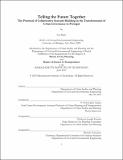| dc.contributor.advisor | P. Christopher Zegras. | en_US |
| dc.contributor.author | Rayle, Lisa (Lisa Michelle) | en_US |
| dc.contributor.other | Massachusetts Institute of Technology. Dept. of Civil and Environmental Engineering. | en_US |
| dc.coverage.spatial | e-po--- | en_US |
| dc.date.accessioned | 2011-03-07T15:16:43Z | |
| dc.date.available | 2011-03-07T15:16:43Z | |
| dc.date.copyright | 2010 | en_US |
| dc.date.issued | 2010 | en_US |
| dc.identifier.uri | http://hdl.handle.net/1721.1/61570 | |
| dc.description | Thesis (M.C.P.)--Massachusetts Institute of Technology, Dept. of Urban Studies and Planning; and, (S.M. in Transportation)--Massachusetts Institute of Technology, Dept. of Civil and Environmental Engineering, 2010. | en_US |
| dc.description | Cataloged from PDF version of thesis. | en_US |
| dc.description | Includes bibliographical references (p. 137-143). | en_US |
| dc.description.abstract | In cities worldwide, the geographic and functional mismatch between urban governance structures and the actual dynamics of urban activities has hindered efforts to achieve sustainable and equitable development at the metropolitan scale. Overcoming this mismatch requires coordination between typically fragmented government agencies-and this coordination requires inter-organizational collaboration. In Portugal, the twin challenges of declining urban centers and sprawling suburbs, combined with the absence of a metropolitan planning structure, have heightened the importance of inter-agency collaboration, especially in terms of land use and transportation. In contrast to typical studies of policy integration, which tend to focus on barriers to collaboration, in this thesis I examine forces which contribute to its emergence. I consider two questions: first, what conditions and factors have actually led to inter-organizational collaboration in the Portuguese context? Second, what is the potential for a particular scenario-building process to lead to further collaboration among those who participated? Study of existing collaborative arrangements reveals five conditions which appear to contribute to the emergence of collaboration. A qualitative and quantitative analysis of scenario-building workshops conducted with stakeholders in Portugal suggests that these exercises have increased the likelihood of the future collaboration among participants to a small degree. Finally, recognizing that collaboration is necessary, but not sufficient, for better metropolitan-level development, I suggest ways in which government policy can take advantage of pro-collaboration forces. | en_US |
| dc.description.statementofresponsibility | by Lisa Rayle. | en_US |
| dc.format.extent | 203 p. | en_US |
| dc.language.iso | eng | en_US |
| dc.publisher | Massachusetts Institute of Technology | en_US |
| dc.rights | M.I.T. theses are protected by
copyright. They may be viewed from this source for any purpose, but
reproduction or distribution in any format is prohibited without written
permission. See provided URL for inquiries about permission. | en_US |
| dc.rights.uri | http://dspace.mit.edu/handle/1721.1/7582 | en_US |
| dc.subject | Urban Studies and Planning. | en_US |
| dc.subject | Civil and Environmental Engineering. | en_US |
| dc.title | Telling the future together : the potential of collaborative scenario-building in the transformation of urban governance in Portugal | en_US |
| dc.title.alternative | Potential of collaborative scenario-building in the transformation of urban governance in Portugal | en_US |
| dc.type | Thesis | en_US |
| dc.description.degree | S.M.in Transportation | en_US |
| dc.description.degree | M.C.P. | en_US |
| dc.contributor.department | Massachusetts Institute of Technology. Department of Civil and Environmental Engineering | |
| dc.contributor.department | Massachusetts Institute of Technology. Department of Urban Studies and Planning | |
| dc.identifier.oclc | 703272794 | en_US |
